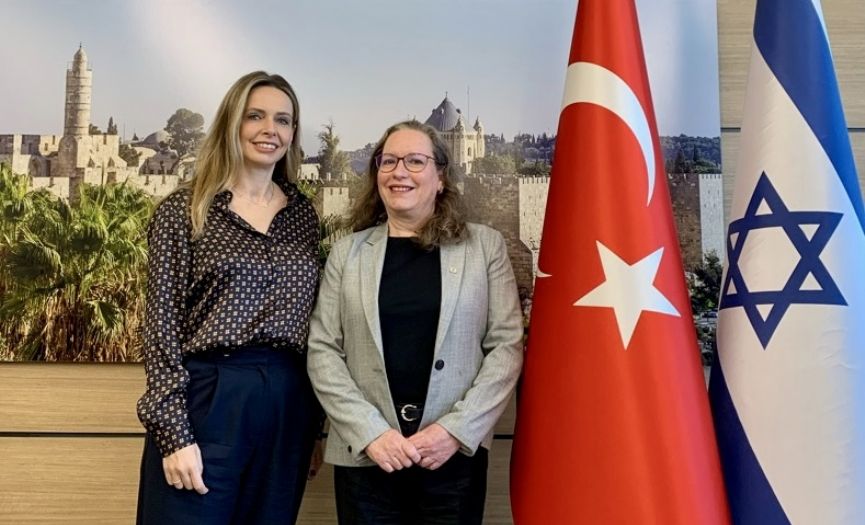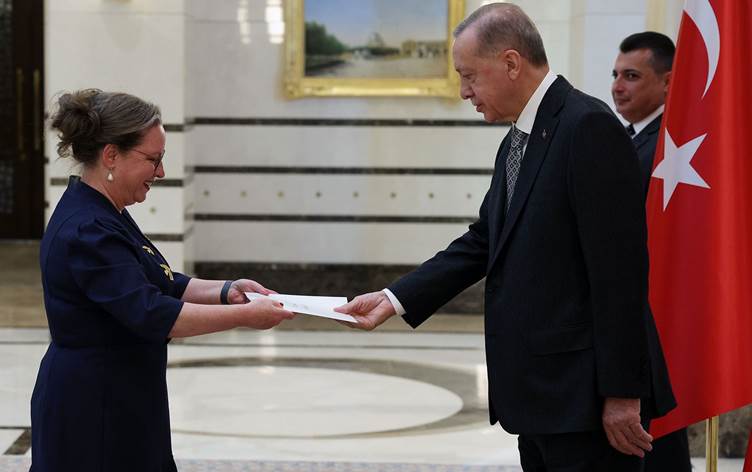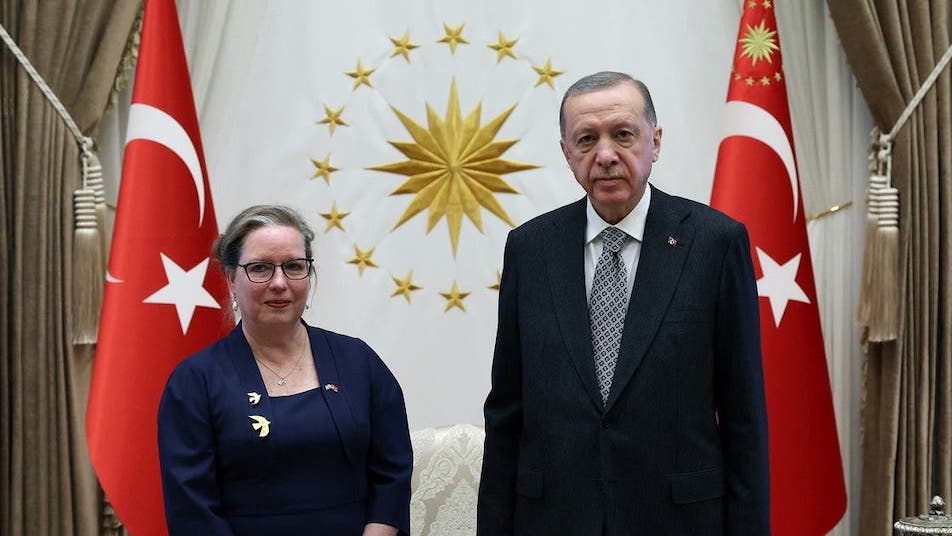
Israel´s Ambassador to Turkey Irit Lillian: Turkey Stands by Itself for the Merit and Importance of Our Mutual Relations
Turkey and Israel have officially exchanged ambassadors after years of tense relations. Israel´s ambassador to Turkey Irit Lillian presented her credentials to President Erdogan on December 27th. One of Israel´s top diplomats, Lillian, had been working tirelessly as the chargé d´affaires at the embassy in Ankara to mend bilateral relations. Lillian shared her thoughts on Turkey-Israel relations for Shalom readers. A big fan of Turkish culture, traditional music and cuisine, the ambassador is learning Turkish and promised to answer a question in Turkish in our next interview.
You fill a post that has been vacant for four years. The reappointment of the ambassadors is a significant indicator of warming ties between the two countries. As you said on Twitter after you presented your letter of credentials to President Erdoğan, "We look forward to many more positive developments in the bilateral relations." You have been Israel's chargé d'affaires for almost two years. First of all, I would like to ask you, what has changed so that we witness a normalization in bilateral relations after so many years of tension?
I think that the most important change is the atmosphere—the atmosphere of goodwill from both sides. Before, we were more hesitant about the different steps we took in order to get back together again. And we cannot hide the fact that the relations were in crisis for a very long time. At least four years, if we count from the time the ambassadors were sent back. If we go back to Mavi Marmara, it was almost a decade since the relations were very tense. During this time, mistrust has been created between the two sides. But when I came here, I could already feel the change. There was a will from both sides to try and repair the relations. We did it gradually, hesitantly, but firmly. And nowadays, I think the main change is the willingness of both sides not just to walk slowly, but rather to run with mutual projects. I think this is the main development. And when you have this goodwill, and you have the prospects on the horizon for a better future, for different relations, or a different era of relations between the two countries, then everything can be achieved.

“WE SHALL SEE POSSIBLE DEVELOPMENTS IN THE FIELD OF STRATEGIC AND DEFENSE COOPERATION”
Turkey and Israel were close allies in the 1990s, especially on security issues. Even “strategic allies” according to then Prime Minister Tansu Çiller. Can we expect a renewed strategic alliance?
We can expect everything. However, there were many geostrategic changes in the region, some of them worked as very positive facilitators for the rapprochement, others are more complicated. And therefore, I think that in this particular field of strategic cooperation, defense cooperation, we shall see possible developments, especially after the visit of our former Minister of Defense Benny Gantz. Nevertheless, the developments in this particular field will go gradually, at a slower pace. We were put into a situation where cooperation was needed ad hoc last spring when there were threats against Israeli tourists in Turkey by an Iranian terrorist cell. At that time, cooperation was wonderful which was a very good sign of the possibilities on our mutual table. There is much to gain from cooperation. Both sides are calculating their steps carefully. By its nature, it is a more gradual process, unlike the economic, cultural, academic, and ties on agriculture, health, you name it, in which we are moving at a different pace. Still, I think the potential is there. We have to take it a step at a time. We respect Turkish interests, and we feel that the Turkish government also respects Israeli interests.
Since the deterioration of the bilateral relations between Israel and Turkey, Israel and Greece improved their relations. Many times, Israel tried to convince Greece that enhancing its relations with Turkey would not come at the expense of its ties with Greece. How may this affect Turkish-Israeli relations?
It should not. Both Turkey and Israel have relations with so many countries in the world. Our relations with Turkey don't come on account of our relations with Greece, and our relations with Greece and Cyprus don't come on account of Turkey. Each and every bilateral relation have its specific characteristics. I think that Israel has good relations with many of the countries in this sub-region and Turkey has good relations with countries that Israel doesn't have good relations with or doesn't even have diplomatic ties with some, serves the interest of both sides. It is contributing to peace and stability in a larger region. So it's a win-win situation.
“IN ISRAEL AND TURKEY RELATIONS, WE PROVED THAT WE DON'T NEED ANY THIRD PARTY”
Azerbaijan is a country that both Turkey and Israel are very close and have good relations. Can we expect an alliance or cooperation between these three countries? Once Azerbaijani Foreign Minister even said that Baku could mediate between Turkey and Israel…
Each and every country has its own interest vis-a-vis a third country. The fact that both Israel and Turkey have very good relations with Azerbaijan brings the wonderful potential to the peoples of all these countries. In Israel and Turkey relations, we proved that we don't need any third party. Relations between Israel and Turkey are historical, and bridges have always existed between the two countries, even in bad times. In this marriage, we have a good basis for dialogue. It proved to be a very fruitful, positive dialogue by the mere fact that within a year we managed to restore the relations, have the ambassadors back, and plan for the future.
In this marriage, we have another party, the United States. Some analysts argue that Turkey may ask for Israel's help in its crisis-ridden relations with Washington. In Turkey, there is always the idea that Israel is very powerful in Washington. Traditionally, Turkey has seen Israel as a way to get its voice heard in Washington. What is your take on this issue?
There are mutual interests for sure, but why does Turkey need Israel for that? I'm not the one to comment on Turkish foreign policy, but we all know that the Presidents and foreign ministers of Turkey and the US talk to each other. They don't need Israel to open doors. I can always say that this is what friends are for. On the other hand, friends should know their place; where we can be helpful and where there is no need for our help. Israel's relations with the United States are very special. It's a strong and profound alliance. Turkey's dialogue with the United States is strong as far as I can analyze it. We don't always have to look at the third party; we should look more on the bilateral level. And this is where our greatest potential is.
You already answered my next question, but let me ask you another way. There were some discussions on Turkey being the next Abraham Accords candidate. But, as you said, the relations between Turkey and Israel are more profound and historical. So Turkey is not in the same boat…
We are not in the same boat. The Abraham Accords is a game changer in our region. It is very important because it opened a gate for many political opportunities, it broke the paradigm that Israel cannot have good relations with the Arab world. The relations with Turkey, on the other hand, are historical. This relationship has features that go back not only 75 years ago to the creation of the State of Israel, or to the fact that Turkey was the first Muslim-majority country to recognize the State of Israel. Our relations go hundreds and thousands of years back to the mutual history between the Turkish and Jewish people. Turkey stands by itself for the merit and the importance of our mutual relations, which, to my mind, has different features and great importance.
Energy has been the primary driver for the first normalization in 2016. Turkey has an advantage as a hub in the region and is the most cost-effective option. Having said that, continuing the marriage analogy, I think pipeline cooperation is like a Catholic marriage; you need to build trust first because you cannot divorce easily. Can we expect a development in this area?
When we speak about energy, there is a misconception because, we don't speak only about the pipelines. Speaking about the pipeline is a bit of the language of the past. It's true that the Ukraine crisis brought back to the limelight the importance of natural gas, the need of energy for Europe, and a need for a quick solution. But don't forget that before this crisis, we were all looking into 2030, a period in which we would use less fossil energy. We have to look more into renewables, we have to go green. We have to look into different technological solutions. I believe that now with the warming of the relations, we have a wonderful opportunity to discuss energy, from a different and more up to date point of view.
Israel has never left the idea of the EastMed pipeline project. I'm not saying that this will necessarily be only the project of the future, but we are committed to it. To be prepared for the challenges of the future, we have to look for the solutions of the future. Building a pipeline takes time. We have to think out-of-the-box or out of the pipeline. We have to think in a way that would bring the two countries closer together, bringing the young scientists working on our future together. Ministers of energy can discuss the current problems, the pipelines, and fossil energy. Still, they also have to speak about reducing the gas emissions. There is a lot to talk about in the field of energy but we have to think differently about energy cooperation. 2016 is not 2023.
Trade survived all the turmoil in the relations over the ‘lost’ decade. Although I believe it grew below its potential. What is the reason for that? Is it because the two country's economies complement each other?
I don't have the final figures for the end of 2022. We passed the $9 billion trade volume for sure. It's huge. It's bigger than Turkey's trade with Japan and many other countries. It puts Israel in the top ten and maybe even the top five. The potential is enormous, as you said. This potential can be fulfilled. The two economies are very different in nature. Israel's service sector grew very big in the past decade, while Turkey is very much of a manufacturing country. Israel, as much as Turkey, is very much worried about the cost of living. We believe that the fact that the Turkish market is so close to us gives an advantage to Turkish exporters. On the other hand, Israel is a very small market. We see a lot of potential for cooperation in the field of the high-tech, thus, changing the balance. The numbers are very big but very much tilted toward the Turkish side. The export from Turkey is much bigger than that from Israel to Turkey. I believe that we have not yet started scratching this field's potential. We missed a decade in which both countries have gone through tremendous economic developments. We have to look into the new features of the markets. Some of them are of complementary economies, but other of parallel economies: The relations are unique, but the results prove to be very, very positive.

“WE UNDERSTAND THE SENSITIVITIES OF TURKEY WHEN IT COMES TO JERUSALEM AND THE PALESTINIAN ISSUE”
There are still issues that may cause problems between the two countries, such as Netanyahu's new government’s controversial decisions on Jerusalem or Palestinians. But Israel also has its own redlines. During the 2016 normalization agreement, Hamas was an important issue. Is there any development on this issue?
Everybody knows our views about Hamas. We think that Hamas is a terrorist organization and its offices should be closed. That's the Israeli view. We don't see eye to eye on that matter, that's for sure. I would like to go and quote what both President and the Foreign Minister of Turkey had recently said. They both stated that we should respect the sensitivities of each other. By respecting the sensitivities of each other, we can also agree to disagree on some issues. This is what we did in the past. I'm not saying that in this open and candid dialogue, there will not be subjects on which we will completely disagree. But we understand the sensitivities of Turkey when it comes to Jerusalem and the Palestinian issue. We also have sensitivities when it comes to Jerusalem. We have a status quo to preserve. We also have our religious sensitivities. But when you decide on the principle that both sides respect the sensitivities of each other, we can talk about it and try to find solutions with an open heart. Then we shall be on the safer ground. We can meet some of stumbling blocks on this safe ground. But by keeping the mechanism of de-confliction, I think that even stumbled blocks are not stumbled mountains. They're just blocks. And we can work together respecting the sensitivities of each other, to lift them on our way.
“I MUST PRAISE THE WONDERFUL JOB THE TURKISH EMBASSY IN ISRAEL IS DOING IN PROMOTING TURKEY”
I remember the 1990s and the beginning of the 2000s vividly. There was a soccer player, Haim Revivo, and there was a love song about him. I remember seeing the Israeli flag on the stadium. And then there were a lot of Israeli tourists and Hebrew signs in the Grand Bazaar and Antalya. After years of being apart and all the negative propaganda about Israel, do you believe we can return to those days? I am not referring to politics but to relations from people to people…
They're back. There are signs in Hebrew in the markets of Antalya. We had a remarkable number of Israeli tourists coming to Turkey this year. We broke the record of all years: 800,000 Israeli tourists. The previous record was 580,000 in 2008. After that, numbers started deteriorating. But we see the thirst of the Israelis to come back to Turkey. These tourists are coming back home saying the Turkish people received them so well. There are many similar features between the two cultures. There is plenty of space for interaction between NGOs, civil society, high school students, academicians, musicians, you name it.
People are not aware of the fact that in Israel, there is a huge fan club for Turkish TV dramas. Turkish artists are performing in Israel and sold out months before they arrive. Israeli musicians like Mark Eliyahu are coming here, and they're popular. Nobody says, oh, this is an Israeli therefore we would not go to the performance. On the contrary, when he sings in Hebrew, Turkish, or in any other language or just the language of music, people are thrilled by it.
Some groups were more problematic throughout the years of crisis. But if we are speaking about the more profound currents and deep historical relations, one should not forget that in Israel, we have a very big community of Turkish descendants. And here we have a big and strong Jewish community. These two communities are wonderful bridges. And you have so many people who are coming again and again to Turkey. Some for healthcare process, others are coming again and again just because they love this place. Israelis love shopping, traveling, cultural traveling, hiking… Turkey is a wonderful destination for all of that. And I must also praise the wonderful job the Turkish embassy in Israel is doing in promoting Turkey. I have been in Israel lately. On TV, you see lots of advertisements saying come visit Turkey. They show Turkey not as heaven to shop, but they show diving, skiing, hiking, and Israelis are coming to experience it.
Related News










